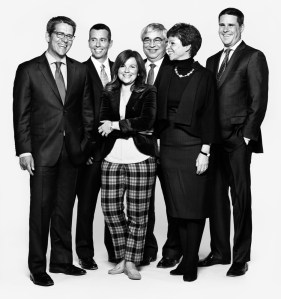
In its second incarnation, the Obama campaign began to blur and then obliterate the line between politics and daily life for millions of Americans. The President held off-the-record calls with FM disc jockeys in black and Hispanic communities. Aides signed up Latinos at amateur soccer leagues, circulated clipboards in bars and nightclubs and canvassed blockbuster-movie-premiere lines for new voters. “In Chapel Hill for a wedding,” White House aide Tommy Vietor e-mailed Plouffe in mid-September from North Carolina. “Multiple people with Obama clipboards have tried to register me to vote in the 5 hours I’ve been here.” Later that night, Vietor read the specials scribbled on a chalkboard at a bar. The Obama was a shot of Jack Daniel’s and a Pabst Blue Ribbon for $7. The Romney was a shot of Johnnie Walker Gold and a bottle of 1995 Altamura cabernet for $870. The message was breaking through.
And so were the new methods devised by a geek squad convened from multinational ad agencies, corporate consultancies and high-tech start-ups. The goals were the same as ever: more money in the bank, more door knocks, more phone calls, more voter registrations and more voters at the polls. But the methods for achieving those ends in 2012 bordered on the revolutionary. A squad of dozens of data crunchers created algorithms for predicting the likelihood that someone would respond to specific types of requests to accomplish each of those goals. Vast quantities of information were collected and then employed to predict just which television shows various target voters in certain cities were watching at just what time of day — the better to decide where to place TV ads. Facebook, which was an afterthought in 2008, became the new electronic telephone call, employed to persuade more than 600,000 Obama supporters to reach out to 5 million swing-state friends online with targeted messages in the days before the election. One woman in central Ohio who was living with her young voting-age daughter reported that her house got four different visits on the morning of Election Day, each from a different neighbor making sure both women had remembered to vote.

Bjarne Jonasson for TIME
The White House Staff: from left: Jay Carney, the spokesman, handled the White House press; David Plouffe, the political strategist, steered the campaign’s White House outpost; Alyssa Mastromonaco, the deputy chief of staff, kept the President focused; Pete Rouse, the senior adviser, was the go-to troubleshooter; Valerie Jarrett, Obama’s closest adviser, was his sounding board; Dan Pfeiffer, the communications director, decided how to deliver the message
The geek squad also found new ways to make voters turn out their pockets. They refined meet-the-candidate lotteries into an art form, invented a system for texting dollars from a mobile phone that required entering only a single number and experimented with the language of e-mail pitches until they stung. Of his $1 billion campaign-cash haul, Obama was able to raise $690 million online in 2012, up from about $500 million in 2008. More than $200 million of that came in donations of $200 or less, a 10% increase over the history-making frenzy of 2008. In a campaign that big super-PAC money was supposed to dominate, Obama’s operation proved that many small efforts were more powerful than a few big ones. No one in either party thinks campaign finance will ever be the same.
How much of this survives for future Democrats when Obama exits the stage? Obama’s advisers are quick to say it won’t be around for others to tap. Too much of the Obama coalition, they say, is about Obama himself. It might reject anyone who tries to take up his mantle in a few years. “This organization is not transferable,” says a senior campaign adviser. “The next nominee on either side is going to have to build their own coalition.” But the Obama effort is going to try to live on. Bob Bauer, the campaign’s attorney, has been working on a plan for a new organization — likely to be incorporated as a nonprofit beyond the reach of the Democratic National Committee — that will be announced in the coming weeks. The idea is to create an outlet for Obama’s supporters, more than 80,000 of whom said after the election that they were willing to run for public office. A similar effort stumbled in 2009, when Obama reined in his grassroots supporters to avoid ruffling feathers in Congress. But the one thing Obama has learned in his first term is that he won’t be able to accomplish much in the second without an active outside game.
The fifth year of any presidency is always a sweet spot, a golden hour between re-election and lame-duck status, when a President has a chance to think more about history than about the tracking polls. And so the President must now decide how high to reach and what to accomplish while he still can. “I’m more than familiar with all the literature about presidential overreach in second terms,” Obama said at his first press conference after the election. “On the other hand, I didn’t get re-elected just to bask in re-election.”
He began to navigate the issues in the days after the election by scribbling his hopes on a yellow legal pad. Obama has always thought best by writing, and for that reason he struggled to keep a diary during his first term, a task at which he hopes to redouble his efforts over the coming years. “In my life, writing has been an important exercise to clarify what I believe, what I see, what I care about, what my deepest values are,” he says. “The process of converting a jumble of thoughts into coherent sentences makes you ask tougher questions.”

